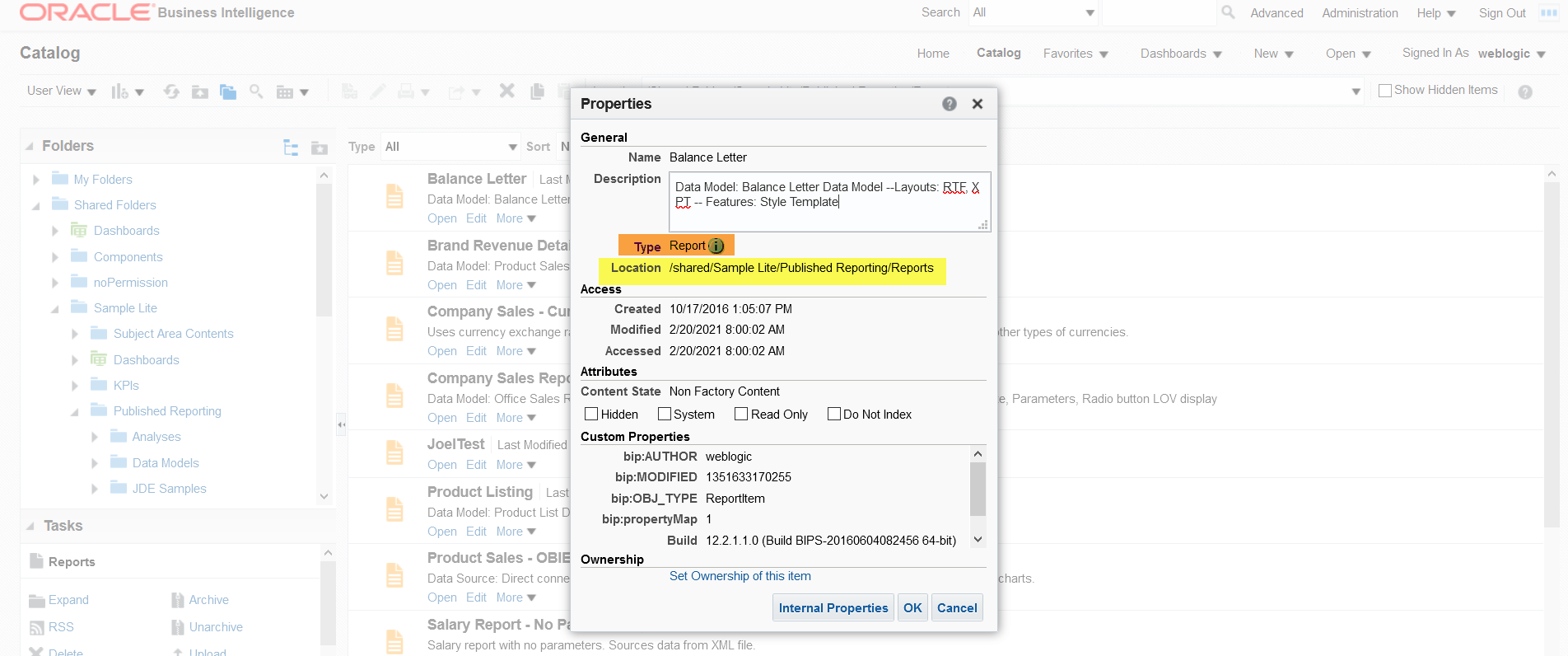Source Control for the RPD and WebCatalog Objects
Oracle BI plugin supports sourcing RPD and WebCatalog files from either development environment directly or from source code repository. SCM option requires that developers commit required files to choice of SCM. Customers can choose option that works well for them, use of SCM is preferred practice in general.
RPD
Source controlling the RPD is as simple as checking the RPD into your source code repository with the extension of rpd. It is recommended that you create separate folder for RPD file in your source code repository. You can also keep RPD configuration file in this same folder to allow for replacement of connection pool details when RPD is deployed to various environments. rpdBuild plugin operation will now recognize the rpd file and save it as artifact for deployment to other environments.
Now when you have newer version of RPD file, simply download and commit it to source code repository.
WebCatalog
Oracle BI WebCatalog objects are deployed in specified structure. Additionally, there are few different types of objects available in Oracle BI WebCatalog. When sourcing from source code repository, FlexDeploy Oracle BI plugin requires that developers download and commit files in matching folder structure and with appropriate extension.
Oracle BI (Oracle Business Intelligence in pre-5.5.0.1) project type:
Objects stored in source code repository should be named with the following extensions:
| Object Type Code | Object Type Name | File Extension in Source Control |
|---|---|---|
| FOLDER | Folder | .fldr |
| ANALYSIS | Analysis | .anlys |
| DASHBOARD | Dashboard | .db |
| DASHBOARD_PROMPT | DashboardPrompt | .dbp |
| REPORT | Report | .rprt |
| DATAMODEL | Datamodel | .dm |
| STYLE_TEMPLATE | StyleTemplate | .st |
| METADATA | Metadata | .md |
| KPI | KPI | .kpi |
| FILTER | Filter | .flt |
Oracle BI 2.0 project type. @Since 5.5.0.1
Objects stored in source code repository should be named with the following extensions:
OBIEE Type Name | OBIEE Signature / Composite Signature* | Source Control Extension |
|---|---|---|
| Action | action | Action |
| Agent | coibot1 | Agent |
| Analysis | queryitem1 | Analysis |
| Column | cosavedcolumn1 | Column |
| Condition | condition1 | Condition |
| Dashboard | dashboardfolder1 | Dashboard |
| Dashboard Prompt | globalfilteritem1 | Dashboard Prompt |
| Data Model | .xdm * | Data Model |
| Filter | filteritem1 | Filter |
| Group | customgroup1 | Group |
| KPI | kpi1 | KPI |
| KPI Watchlist | scorecardkpiwatchlist1 | KPI Watchlist |
| Mobile App | .xma | Mobile App |
| Report | .xdo * | Report |
| Scorecard | scorecard1 | Scorecard |
| Shortcut | N/A | Shortcut |
| Style Template | .xss * | Style Template |
| Visual Analyzer Projects | projectfolder1 | Visual Analyzer Projects |
For example, let's see following Balance Letter report in /shared/Sample Lite/Published Reporting/Reports Location. Images below are shown for Oracle BI project type, but similar structure is required for Oracle BI 2.0 using the extensions from the table above.
If you Archive this report, it will be downloaded as Balance Letter.xdo.catalog, but in order to work with FlexDeploy you should rename it to Balance Letter.rprt and place it in /shared/Sample Lite/Published Reporting/Reports folder of your code repository.
This can be a bit cumbersome, but it can be further automated. See Automate check-in of development catalog items to SCM.
- style


